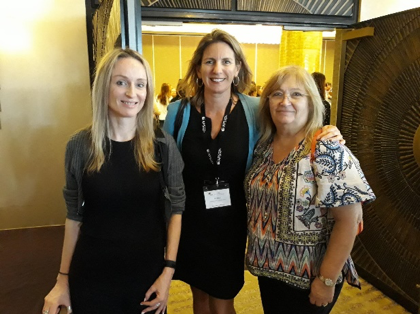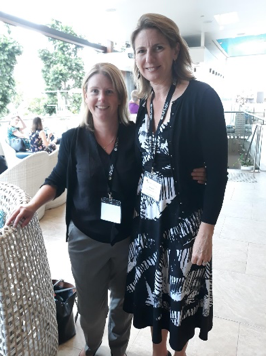CCN Conference, Brisbane 2018
- 6 December 2019
- Nic Ward
Dr Nicola Ward, Clinical and Neuropsychologist, Insight, Laura Fergusson Trust, Christchurch
In November 2018,
I was fortunate to receive a travel grant from NZCCP to facilitate me attending the Australian Psychological Society’s College of Clinical Neuropsychology (CCN) Conference in Brisbane. The organisers of this conference had invited members of NZSIGN (New Zealand Special Interest Group in Neuropsychology) to be part of this year’s conference.
Eight New Zealanders took this opportunity to present at the conference. Six of us combined our presentations to deliver a symposium titled “Neuropsychology Developments Across The Ditch”. Janet Leathem presented Early Developments in Neuropsychology in New Zealand, in which she covered the work of prominent NZ Neuropsychologists such as Dorothy Gronwall, Jenni Odgen, Lynette Tippett and Margaret Dudley. She also discussed the post graduate qualification in Clinical Neuroassessment that ran from 2001 - 2006. I followed on with a talk about Recent Developments in Neuropsychology in NZ, in particular the establishment of NZSIGN and the development of the Neuropsychologist scope of practice.
This was followed by mention of various current Neuropsychology projects in New Zealand. Two of these were discussed in more detail. Sanchia Logie and Kath Murrell presented on the development of an enhanced neuropsychology service at Starship Hospital, and Petina Newton and Snezana Mitrovic-Tosovic presented their role in developing and running memory clinics in the Auckland area.

Alice Theadom was an invited NZ speaker at the conference. Her presentation on the long term impacts of mTBI included the findings of the BIONIC (Brain Injury Outcomes New Zealand in the Community) study (Feigin, V. L., Theadom, A., Barker-Collo, S., Starkey, N. J., McPherson, K., Kahan, M., & Ameratunga, S. 2013). This study collected data on all mild TBIs occurring in the Hamilton and Waikato area in a one year period (2010-11) and has now also collected 1 year, 2 year and 4 year follow-up data. (Eight year follow-up data will be collected next year). These studies are a unique window into outcome for clients with mild TBIs in NZ (especially as these injuries occurred before the development of ACC concussion clinics
The findings demonstrate that a substantial proportion of clients with TBI still experience significant symptoms as measured by the Rivermead at 1 year, and that some of the symptoms are still persisting at 4 years, even compared to non-head injured controls (i.e. their symptoms do not reflect normal base rate experiences of headache and fatigue, for example). Cognitive effects were also seen on testing following mTBI, most notably for complex attention. For many clients these effects did not resolve completely until the 4 year follow-up. Alice concluded that it is currently uncertain what the neuropsychology behind delayed recovery is, and whether it is injury specific or more to do with psychological adjustment to injury.
 This lead nicely into the presentation by keynote speaker Julie Suhr from the University of Ohio. I found her workshop one of the most relevant to my clinical work. She presented an extended version of the Common Sense model of illness to explain Neuropsychological presentations in mTBI, Mild cognitive impairment and ADHD. She discussed how we all develop a personal representation of illness and how this affects our coping strategies and illness outcomes when we fall ill. We then go on to develop an “illness identity” when injured or sick which has implications for our functioning in terms of how we perceive symptoms and react to them, both emotionally and behaviourally, and how we view the severity of the consequences of these symptoms (Leventhal, H. Meyer, D. & Nerenz, D. 1980). Julie presented a wealth of research that supports her expansion of this model (Suhr, J. & Wei, C. 2017) to explain the course of an individual’s experience following these diagnoses. This model seemed particularly effective to me at explaining the variety of presentations and recovery pathways for our clients presenting with mTBI.
This lead nicely into the presentation by keynote speaker Julie Suhr from the University of Ohio. I found her workshop one of the most relevant to my clinical work. She presented an extended version of the Common Sense model of illness to explain Neuropsychological presentations in mTBI, Mild cognitive impairment and ADHD. She discussed how we all develop a personal representation of illness and how this affects our coping strategies and illness outcomes when we fall ill. We then go on to develop an “illness identity” when injured or sick which has implications for our functioning in terms of how we perceive symptoms and react to them, both emotionally and behaviourally, and how we view the severity of the consequences of these symptoms (Leventhal, H. Meyer, D. & Nerenz, D. 1980). Julie presented a wealth of research that supports her expansion of this model (Suhr, J. & Wei, C. 2017) to explain the course of an individual’s experience following these diagnoses. This model seemed particularly effective to me at explaining the variety of presentations and recovery pathways for our clients presenting with mTBI.
Matt Richardson also travelled to Brisbane from Dunedin to present his workshop on NHCBT (Nocebo Hypothesis Cognitive Behavioural Theory) for functional neurological disorders. He has presented this twice in NZ through NZSIGN and there are plans for a third workshop in Wellington next year. Matt’s workshop was well attended and received in Brisbane. Many Australian Clinical Neuropsychologists were excited to hear about his 90% success rate at treating these difficulties (Richardson M, Isbister G, Nicholson B, 2018) and were keen to work with Matt to trial his method in Australia as well as New Zealand.
Other sessions I enjoyed included:
Dana Wong & Sandy Grayson’s - How to run an effective memory skills group using a (slightly modified) version of the ASSBI manualised programme “Making the most of your memory”.
A symposium on family violence and neuropsychology.
How to develop behavioural management skills across subacute services.
As always at good conferences, choosing which session to attend was sometimes difficult, with multiple esteemed presenters on the podium at conflicting times.
Outside of the conference sessions, I really enjoyed the opportunity to get to know my New Zealand colleagues better, including NZ Neuropsychologists attending the conference (Corne Mackie, Kay Cunningham, Christina Russo and Helen Paton) as well as the other Kiwi presenters. The warm Brisbane evenings made for enjoyable socialising in the beautiful South Bank area. In addition the jet lag and early sunrises meant that a run around the botanical gardens was very achievable before 9am - not my usual style!
I was also able to make further links with members of the CCN whom I have had dealings with over recent years but not met in person. Simon Crowe (outgoing chair of the CCN) was very welcoming and supportive of NZSIGN, and introduced me to the new chair Amy Scholes, whom I look forward to working with as we develop an MOU between NZSIGN and the CNN. Their organisation has 380 full members so hopefully we can learn a lot from them about ways to grow and develop NZSIGN. Karen Sullivan and Debbie Anderson were a pleasure to deal with as conference organisers, and I was able to meet Peggy Bain, head of the NSW branch of the CCN, who had been a great source of advice in the early days of NZSIGN.
Clinical Neuropsychology in Australia is different to the model used in NZ, in that Neuropsychologists do not have the same level of Clinical Psychology training that most of us do. Nonetheless, speakers at the conference reflected on the shift away from simply assessment and medico-legal issues to more of a rehab and intervention focus in their work over the last 2 decades. In this, we share a desire to be of use to our clients, not just in qualifying their difficulties, but in working with them to move through the areas of challenge to be able to meet their goals in life.
Huge thanks must go to the NZCCP and my employer Laura Fergusson Trust for enabling me to take up this opportunity, and to the other New Zealand presenters for taking the time and finding the resources to present our work to our colleagues ‘across the ditch’.
Nic Ward
References:
Feigin, V. L., Theadom, A., Barker-Collo, S., Starkey, N. J., McPherson, K., Kahan, M., & Ameratunga, S. (2013). Incidence of traumatic brain injury in New Zealand: A population-based study. The Lancet Neurology, 12(1), 53–64.
Leventhal, H., Meyer, D., & Nerenz, D. (1980). The common sense representation of illness danger. Contributions to medical psychology, 2, 7-30.
Richardson, M., Isbister, G., & Nicholson, B. (2018). A Novel Treatment Protocol (Nocebo Hypothesis Cognitive Behavioural Therapy; NH-CBT) for Functional Neurological Symptom Disorder/Conversion Disorder: A Retrospective Consecutive Case Series. Behavioural and cognitive psychotherapy, 1-7.
Suhr, J.A., & Wei, C. (2017). Attention Deficit/Hyperactivity Disorder as an illness identity: Implications for neuropsychological Practice. In K.B. Boone (Ed.), Neuropsychological Evaluation of Somatoform and Other Functional Somatic Conditions: Assessment Primer. NY: Taylor and Francis.
